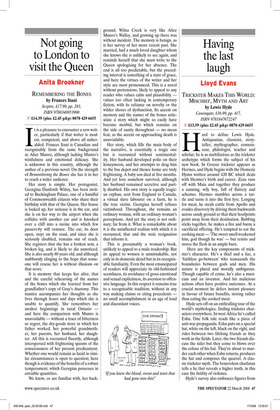Not going to London to visit the Queen
Anita Brookner
REMEMBERING THE BONES by Frances Itani Sceptre, £17.99, pp. 283, ISBN 9780340953990 ✆ £14.39 (plus £2.45 p&p) 0870 429 6655 It is a pleasure to encounter a new writer, particularly if that writer is modest, competent, and above all unheralded. Frances Itani is Canadian and recognisably from the same background as Alice Munro, although lacking Munro’s wistfulness and emotional delicacy. She is unknown in this country, although the author of a previous novel. On the strength of Remembering the Bones she has it in her to reach a wider audience.
Her story is simple. Her protagonist, Georgina Danforth Witley, has been invited to Buckingham Palace, one of a handful of Commonwealth citizens who share their birthday with that of the Queen. Her house is locked up, her suitcase is in the car, and she is on her way to the airport when she collides with another car and is knocked over a cliff into a ravine into which few passers-by will venture. The car, its door open, stays on the road, and since she is seriously disabled, remains out of reach. She registers that she has a broken arm, a broken leg, and is likely to die unnoticed. She is also nearly 80 years old, and although stubbornly clinging to the hope that someone will rescue her is without illusions on that score.
It is memory that keeps her alive, that and the careful rehearsing of the names of the bones which she learned from her grandfather’s copy of Gray’s Anatomy. This mantra accompanies her thoughts as she lives through hours and days which she is unable to quantify. She remembers her modest beginnings in rural Ontario — and here the comparison with Munro is unavoidable — without a trace of bitterness or regret, the dry-goods store in which her father worked, her powerful grandmother, her parents, her husband, her daughter. All this is recounted fluently, although interspersed with frightening spasms of the consciousness of her present predicament. Whether one would remain as lucid in similar circumstances is open to question; here though is evidence of the benefits of a robust temperament, which Georgina possesses in enviable quantities.
We know, or are familiar with, her back ground. Wilna Creek is very like Alice Munro’s Walley, and growing up there was without incident. The memory is benign, as is her survey of her more recent past. She married, had a much loved daughter whom she knows she is unlikely to see again, and reminds herself that she must write to the Queen apologising for her absence. The end is all too predictable, but the preceding interval is something of a state of grace, and here the virtues of the writer and her style are most pronounced. This is a novel without pretensions, likely to appeal to any reader who values calm and plausibility — values too often lacking in contemporary fiction, with its reliance on novelty or the wilder shores of dysfunction. Its accent on memory and the names of the bones articulate a story which might so easily have become morbid, but which remains on the side of sanity throughout — no mean feat, as the accent on approaching death is unavoidable.
Her story, which fills the main body of the narrative, is essentially a tragic one but is recounted without sentimentality. Her husband developed polio on their honeymoon, and her attempts to drag him to the bus depot and thence home are truly frightening. A baby son died at five months. And yet love somehow survived, although her husband remained secretive and partly disabled. His own story is equally tragic: an orphan, sent from England to Canada, a virtual slave labourer on a farm, he is the true victim. Georgina herself refuses victimhood. Throughout, she remains an ordinary woman, with an ordinary woman’s perceptions. And yet the story is not ordinary; far from it. What is remarkable about it is the uninflected realism with which it is recounted, that and the stoic resignation that informs it.
This is presumably a woman’s book, unlikely to appeal to a male readership. But its appeal to women is unmistakable, not only in its domestic detail but in its recognisable familiarity. Even the most emancipated of readers will appreciate its old-fashioned seemliness, its avoidance of gross emotional and sexual explicitness, its aversion to offensive language. In this respect it remains true to a recognisable tradition, without in any way making claims or citing precedents — no small accomplishment in an age of loud and discordant voices.


















































































 Previous page
Previous page